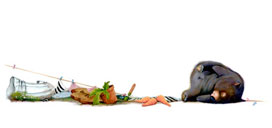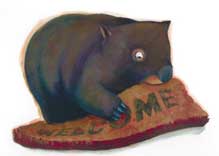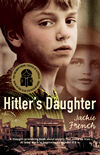Hitler's Daughter (1999 Harper Collins)
Winner Younger Readers section CBC Book of the Year;
shortlisted for Vision 200 and Cool awards;
shortlisted for the 2001 Yabba and Koala awards
The bombs are falling, the smoke is rising from the concentration camps, but all Hitler's daughter knows are the lessons with Fraulein Gelber and the hedgehogs she rescues from the cold.
Did Hitler's daughter exist? Is it all too long ago to really matter . . .
Some books take a long time to grow. Hitler's Daughter first germinated when I was still a child, and a kind man helped me with my German translation. I'd been panicking, shrieking 'My life is ruined! I can never go to school again!' and in desperation my mother called a friend of hers over then went to bed.
It was late at night and he'd been drinking. Something in the story we were translating must have caught him, because there in the silent house he began to tell me another story, about a 14 year old boy in Nazi Germany who joined the Nazi party and worked in a concentration camp and when the war ended was smuggled out to Australia. And no, that isn't really how it happened, because I don't want to identify him. Perhaps he was just a man I met on a bus . . .
'How do you tell good from evil,' he asked me 'When the world around you is insane?'
I forgot about the incident as teenagers do for over thirty years. Then three years ago I took my mother and 14 year old son to see a performance of Cabaret.
There is a scene in the play where the young waiter sweeps the floor of the cafe; the lights are low, the stage is empty and he sings 'Oh gather together and greet the dawn, tomorrow belongs to me.'
My son sat there entranced. 'That's was me,' he told me later. 'I kept thinking, that's me and my friends. Tomorrow belongs to us.'
Then the waiter began the final verse: Oh Fatherland Fatherland show us the sign, your children are waiting to see, the morning will come when the earth is thine, tomorrow belongs to me.' The lights on stage rise and suddenly the waiter lifts his arm in the Nazi salute . . .
My son sat there stunned. He realised he had been identifying with a Nazi song. He also realised that if he had lived in Germany in 1936, he and his friends might have been Nazis too.
How do you tell good from evil when the world around you is insane?
Well, one way is from books. Every book, no matter how trivial, is a record of the way the author sees the world, a map of their values. It doesn't matter whether you intend to do it or not: it just happens. Show me any book and I will tell you at least some of the values of the author. 'Give me a girl at an impressionable age,' said Miss Brodie, 'and she's mine for life.'
Well, I believe that if you give a child at an impressionable age a thousand books, you are giving them a thousand different world views. No two people ever have quite the same world views. Expose a child to enough good books, and they will learn to think. Books give you a depth of values and ideas in a way that movies and televison never can. (And yes, I'm prepared to argue this in more detail...but don't have room here!)
When I was 14, trying to do my German homework, I came across a passage I couldn't translate. My mother called a friend of hers who spoke German to help me.
It was late by then. He came over, and my mother went to bed, and we worked on the translation. But I think something in the story we were translating must have moved him (and perhaps he'd been drinking too- he hadn't known he was going to be called out to help a kid with her homework.) Because there in the silent house he began to tell me quite a different story.
He told me about a 14 year old boy, in Hitler's Germany, who joined the Nazi Party, because his parents were Nazis, his teachers were nazis. All he had ever heard or read said it was good to be a Nazi. He believed it all- the duty to rid the race of anyone who was blind, or lame, who was Jewish or Gypsy or homosexual, or anyone who believed in their religion more than Hitler, or who disagreed with his policies and had the courage to say so.
He became a guard in a concentration camp, because that is what 14 year old boys were doing in Germany at the end of the war. And when the war was over he was illegally smuggled out of Germany, with his parents, as many Nazi war criminals were.
He said to me 'When you are 14, and the world around you is insane, how do you know what is good and what is evil? How do you know?"
(And I've changed some of the circumstances here, because he was a good man, who had spent his life trying to atone for what he'd done. And he had only been 14)
I forgot his words for many years. Then ten years ago I took my mother, my brother, my cousin and my 14 year old son to the theatre to see Cabaret for my mother's 70th birthday. The play is set in Germany, just as Hitler is coming to power. Half way through the teenage waiter sings the most beautiful song 'Tomorrow belongs to me.'
I watched as my son stared at the singer entranced. As he said to me later 'That song was about me and my friends. Tomorrow belongs to us.'
Then half way through the song it changes. The lights come up...you realise the waiter is wearing a Nazi uniform. The orchestra stands, and they too are wearing Nazi uniforms. And my son sat there in shock, because he had been identifying with a Nazi song. He said he realised how he so easily may have become a Nazi, if he had been 14 in Hitler's Germany.
How do you know what is good and evil when you are 14, and the world around you is insane?
If you are 14, and you realise evil is happening, what can you do? No one listens to 14 year olds...or do they?
If you are Hitler's Daughter, after the war, do you have to say you are sorry for what your father has done, and that you had no part of?
(And no, I don't have answers to those questions. But I think they are good ones to ask.)
|


